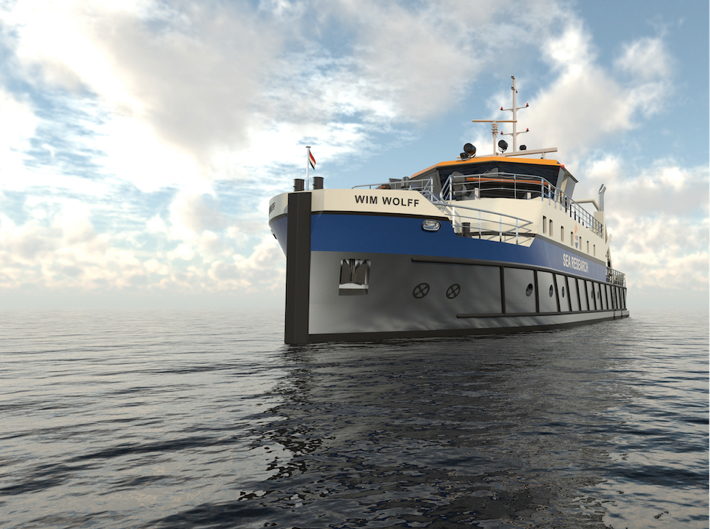Following a tender, the NWO-I Foundation Board has awarded the construction of research vessel Wim Wolff to Thecla Bodewes Shipyards. The ship will have a Modular Energy Concept, with a propulsion train independent of the energy source system. This enables the use of alternative energy systems, without the need for a major ship conversion.
The new ship replaces the RV Navicula and is the first new vessel in the national research fleet. The vessels are managed by the National Marine Facilities (NMF) at the Royal Netherlands Institute for Sea Research (NIOZ).
For Thecla Bodewes Shipyards, the construction of the modern and sustainable research vessel is a special project with a nice reference.
‘Both the functionality as a research vessel and the green, sustainable approach are principles that suit us well,’ says Thecla Bodewes. ‘The ship’s philosophy – with the development of a sustainable diesel-electric power management system from D&A Electric with a lithium-free battery pack – ensures that the ship has minimal emissions upon delivery. In addition, the ship can easily be adapted to new technologies and energy sources without major renovations.’
Also read: Thecla Bodewes: ‘Hydrogen will become the norm for ships’
Ready for future alternative fuels
The expected lifespan for RV Wim Wolff is likely to exceed thirty years. With marine fuels rapidly evolving into cleaner types, further limiting emissions, power plants could become outdated multiple times within the ship’s life-cycle. That is why the shipyard came up with the Modular Energy Concept, which allows the propulsion system to keep up with changing energy sources.
Appliance of alternative fuel types result in reduction of various forms of emission. RV Wim Wolff will operate on HVO in combination with a battery pack at delivery. HVO stands for “Hydrotreated Vegetable Oils” and is a 100 per cent synthetic diesel fuel, made of bio products and suitable for diesel engines. So HVO diesel is not a fossil fuel.
The vessel is prepared for future use of for example hydrogen or methanol, to further limit emissions.
Less noise
Thecla Bodewes Shipyards, in close cooperation with D&A Electric will focus on maximum fuel savings at partial load, which represents fifty per cent of the operational profile, without compromising on efficiency at design speed.
Operating at the equilibrium of optimal propeller and engine rpm, noise and vibrations of the propeller are noticeably reduced, resulting in less disturbance of the marine environment.
Zero emission ambition
‘With the arrival of RV Wim Wolff, high-quality marine research in the Dutch coastal waters and the Wadden Sea is assured with a modern and sustainable research vessel for the coming decades. With this ship, we are approaching our high green ambition level of “zero emission” as much as is currently possible,’ says NWO-I director Miriam Luizink.
The construction of the ship, which is 36.5 metres long and 10 metres wide with an operational draught of 1 metre, will start shortly. The construction process will take approximately two years. RV Wim Wolff will be completed early 2023. It can then replace RV Navicula in the spring of 2023.








